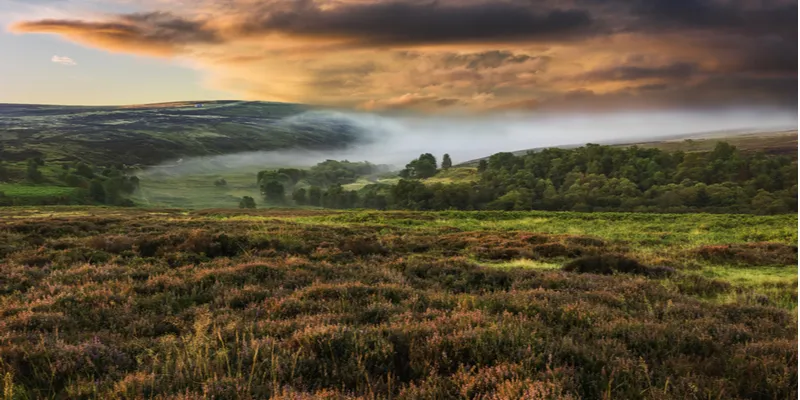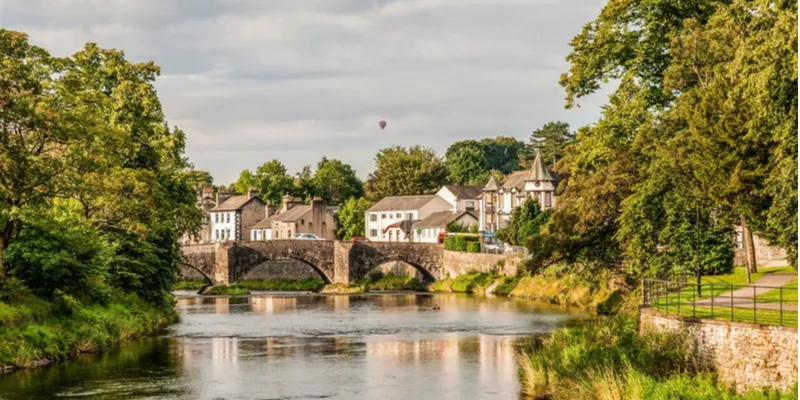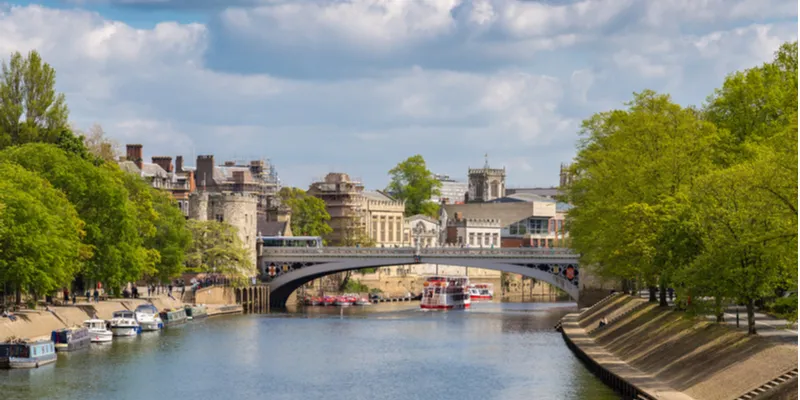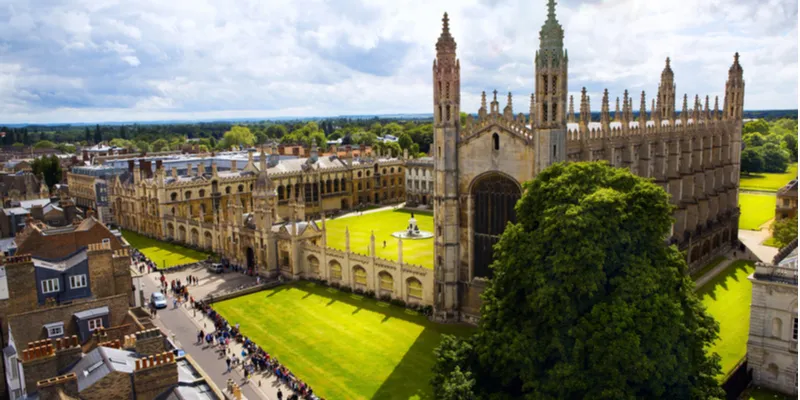Planning an autumn holiday? Check out UK's top 5 destinations
Do you want to enjoy some afternoon tea, remember Heathcliff of Wuthering Heights and explore the countryside? Try this and more at these five UK destinations.
If there’s one place I love returning to, it has to be the United Kingdom. Summer, autumn or winter, showers never rain on my plans – so what if it’s raining – when I’m in this gorgeous country.
The UK is the perfect vacation destination. Beaches, hills, history, architecture, heritage, the moors – the country has all this and more. We list the top 5 UK destinations that you should put on your bucket list to ensure an unforgettable experience.
The Moors
Emily Bronte’s Wuthering Heights, the story of the passionate - and thwarted - love between Heathcliff and Catherine Earnshaw, made the moors famous. England’s most famous moors are Dartmoor and Exmoor, located in Devon (southwest England). Ideal vacation destinations for those who enjoy the rugged outdoors, Dartmoor (the largest open space in southern England) and Exmoor offer the chance of communing with nature in scenic yet harsh surroundings.
Dartmoor, a huge expanse of wilderness, is all about raw granite, barren bogland, sparse grass and heather-grown moor. The yellow grasses, purple flowers and grassy lawns create an attractive picture, but there’s always a mystery surrounding them. Exmoor offers open hilly moorland, a beautiful coastline and upland area with villages.

The moors of North Yorkshire
The ideal base to explore the Devon moors is Upcott Squire – you can plan your walking, hiking, or pony treks from here. The nearby Witheridge and Rackenford Moors offer wildlife viewing opportunities (wild birds, deer and rabbits) as well as the chance to discover Bronze-age burial mounds. The moors are the place to be for people who love the wilderness and the windswept coast.
Go cycling, walking, backpacking, camping, trekking, hiking or plan a secluded picnic on the untamed moorland. Sign up for a wildlife walk and spot birds, butterflies and bats or check out the Dartmoor Otter Sanctuary for a look at the life of the otter. You can also explore the nearby Dorset and East Devon Coast, known as the Jurassic Coast for its geology and geographical features, and the Braunton Burrows UNESCO Biosphere Reserve, a dune complex.
Cumbria
Cumbria, a predominantly rural county said to be one of the most beautiful areas of England, comprises the Lake District and associated Lake District National Park. Scenic villages, beautiful lakes and high moorlands – Cumbria is a holidaymaker's delight. Outdoor activities are aplenty in the Lake District.

Cumbria is a predominantly rural county
Go walking, cycling, riding, climbing, diving, abseiling, caving, off-roading and bird watching. Watersports, golf, swimming and fishing are other options. Visit Hadrian’s Wall, the most important monument built by the Romans in Britain. Families can also check out Wordsworth House, National Park Visitor Centre Brockhole, Whinlatter Forest Visitor Centre, Dock Museum Barrow, Keswick Museum and Cumberland Pencil Museum. Children will enjoy the three historic steam railways, the World of Beatrix Potter and the maize mazes at Calthwaite and St. Bees.
Cumbria also offers many historic sites (abbeys and priories, the remains of the Roman Empire, ancient churches and some of the earliest stone circles in Britain). Don’t forget to stop by at some famous historic houses with gardens - Blackwell Bowness-on-Windermere, Dalemain, Derwent Isle House, Dove Cottage Grasmere Hill Top Near Sawrey and Hutton-in-the-Forest.
Bath

The historic street of large townhouses in the city of Bath
The city where Jane Austen and Thomas Gainsborough once lived, Bath was listed as a World Heritage Site in 1987. The spectacularly beautiful city with its gorgeous architecture –sweeping Georgian terraces and Roman baths built in honey-colored stone – stands on the Avon River. Bath was England’s top spa town in the early 18th century and continues to be a huge draw for tourists.
Visit some of Europe’s finest architecture – the Royal Crescent, the Lansdown Crescent, the Circus and Pulteney Bridge. Check out the Roman baths (with Britain’s only hot spring) and the Thermae Bath Spa (the only place in the United Kingdom where you can bathe in natural warm waters). Take a walk in Royal Victoria Park or chill at Parade Gardens.
Culture lovers will like the Museum of East Asian Art and the Postal Museum. In nearby Salisbury, visit Stonehenge, an iconic and prehistoric monument that is surrounded by the remains of ceremonial structures. Don’t miss the Claverton Pumping Station (Greater Bath) and Corsham Court (Stately home of the Methuen family in West Wiltshire).
Art lovers can check out performances at Bath Theatre Royal, Ustinov Studio, the egg, the Rondo Theatre and the Mission Theatre. Don’t leave Bath without trying the Sally Lunn buns (a type of teacake), Bath buns (very sweet and rich buns) and Bath Olivers (a dry baked biscuit).
York

York in UK
A walled city situated at the confluence of the Rivers Ouse and Foss, York has a rich heritage. Known for its Roman, Viking, and Medieval heritage, beautiful architecture, quaint cobbled streets and the iconic York Minster, York is a huge tourist attraction. What should be on your to-do list? A visit to the York Minster (the second largest Gothic cathedral in northern Europe), the Jorvik Viking Centre (an award-winning exhibition that recreates a Viking settlement), and the National Railway Museum.
At the Yorkshire Museum (you can see Roman sculpture, jewelry and pottery, and some of Europe's greatest Viking and Anglo-Saxon finds), the interactive Fingerprints of Time exhibition is a favourite with families. Drop in at Clifford's Tower, built on top of a Norman motte which was the site of a Jewish massacre in 1190.
Take a guided walk across the city and a boat trip on the River Ouse. Or stop at a bar or a heritage tavern for a drink. Spook fans will love the York Dungeon where a state-of-the-art show that takes visitors to the “Burning Times” of the 16th and 17th centuries when about 200,000 people were condemned for witchcraft. York is also the perfect base to tour the attractions and the countryside of North Yorkshire.
Cambridge

Cambridge University and Kings College Chapel
Home to the world-famous university, Cambridge is charming in all seasons. Located on the River Cam, the college town – picturesque with the cobbled courts, and the many chapels, gardens and bridges – is dominated by the university and its 31 colleges.
The architecture is spectacular. Visit the All Saints Church, Cambridge University Library, Christ’s College (where Charles Darwin studied), Church of the Holy Sepulchre (Cambridge’s second oldest building), Churchill College, Clare College, Clare Hall and Corpus Christi (home to the best surviving medieval court in Cambridge and the Grasshopper Clock). Don’t miss King’s College. What else can you do? Walk the medieval streets, courts and gardens, hire a bike to explore the town, go swimming at the UK’s longest outdoor swimming pool at Jesus Green, picnic under the trees in the many gardens, play a game of tennis at any of the outdoor courts.
Drop in at the Fitzwilliam Museum (it houses Egyptian relics), take a look at the specimens that Charles Darwin collected on his famous trip on The Beagle, or visit the North and South Poles at the Scott Polar Institute.
Art lovers can look at the work of master painters or gaze at modern art at Kettle’s Yard. After exploring the historic market place, chill in the many pubs, cafes and restaurants. You can also visit the Cambridge University Botanic Garden (it has over 8,000 different plant species), the Christ's College Gardens (poet John Milton loves them), Christ's Pieces (a formal park) or the Clare College Gardens. The town of Ely (it houses a spectacular cathedral) and nearby stately homes (Audley End and Wimpole Hall) make for a superb day trip.










